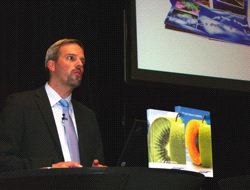Finishing & Screen Printing
Fit for the Future with Modular Systems

Thursday 06. February 2014 - Muller Martini at Druckforum (Printing Forum) in Filderstadt, Germany
From structural change through industry crisis to media revolution, the media industry is in flux, just as it has always been. With an exciting presentation, Muller Martini showed at this year’s Druckforum (Printing Forum) in Filderstadt how graphic arts businesses can position themselves optimally for the future in times of great change.
“The first media crisis dates back some 500 years,” pointed out Jürgen Bender, Managing Director of Muller Martini Germany, in his introductory remarks. “At that time, Johannes Gutenberg began the mass production of the Bible using movable type, resulting in countless copyists in monasteries fearing for their future.” Nevertheless, the handwritten book remained a popular product and status symbol for centuries.
Similar fears have been associated with newspapers, whose death was forecast in the early 20th century when radio came on the scene, and it was thought that radio, in turn, would be shown the door by television. The fact is that these media all still exist, but in changed forms. “The Internet is not supplanting print products, though the existence of major changes cannot be denied,” said Bender. This forces the graphic arts industry to reinvent itself.” Jürgen Bender is convinced that “those who adapt to the changes, react and take appropriate action have a future”.
Particularly High Degree of Investment Protection
Adrian Mayr, Product Management Director at Muller Martini, addressed this topic in his presentation titled Fit for the Digital Future with Modular Systems at the Druckforum. Using the example of the photo book, Mayr showed what print finishing requirements result from digital printing and the variability of products in content, thickness and size, and how this influences processes.
Muller Martini attaches great importance to modularity when developing its print finishing solutions, i.e. on systems enabling print finishing of both conventionally and digitally printed products. “That’s why the modular systems from Muller Martini provide customers with a particularly high degree of investment protection,” stressed Mayr.
Digital Ready for the Future
Switzerland’s market leader in the printing of healthcare inserts and the company with the second largest share of the pharmaceutical printing market in Switzerland, Paul Büetiger AG in Biberist, has already recognized the benefits of modular digital ready systems. The company finishes both its offset and digitally printed products using a Presto II Digital saddle stitcher from Muller Martini to ensure speed and reliability.
Short runs, in particular, have grown in importance in the sense of print on demand, as company owner and Managing Director Paul Büetiger emphasized via video message at the Druckforum: “For us, digital printing only pays off for short and ultra-short runs. Offset is now sufficiently efficient and more cost-effective even for runs from as few as 1,000 copies.”
“The circumstances differ from customer to customer,” said Mayr. “It’s worth looking at every situation individually. The modular systems from Muller Martini equip our customers both for a digital future and a future with offset.”
A company that currently still prints exclusively using the offset method can extend its existing Muller Martini saddle stitcher at any time in the future to include the digital option and use it either for digital sheet-fed printing, for digital web printing or even for combined sheet-fed/web printing applications.
